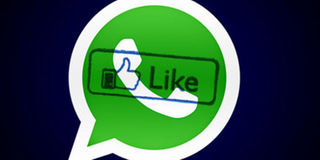What Facebook’s latest Buy Means

What you need to know:
The first thing that Facebook gets is a quick addition of about 30 million users, who are using WhatsApp over mobile phones. By the end of last year, Facebook had 93 million users, with 31 million daily active users on mobile.
Unless, of course, you have been living under a rock, you probably already know Facebook just planted its flag in the WhatsApp living room. But first let’s run the numbers. $19b (about Shs500b), that is just how much Facebook offered for WhatsApp. Yes, that messaging app on your phone that you use daily.
In his statement about the deal, the Facebook CEO, Mark Zuckerberg, said, “WhatsApp is a simple, fast and reliable mobile messaging service that is used by over 450 million people on every major mobile platform. “More than one million people sign up for WhatsApp every day and it is on its way to connecting one billion people.”
First, there was the acquisition of Instagram, and then the launch of Paper. Now, by acquiring the WhatsApp, it is quite well-defined that Facebook is investing profoundly in its own universe of apps. Profoundly, in fact, is an understatement. The mammoth $19b includes $4b (about Shs100b) in cash, 12 billion in stock, and up to three billion set aside in stock options vesting over four years for WhatsApp’s founders and employees.
But WhatsApp has is 450 million users, many of whom are particularly loyal, with 70 per cent using the app daily. The acquisition will certainly give Facebook access to a lot of valuable user data. And WhatsApp is one of the biggest mobile messaging systems on the planet with 19 billion messages sent over WhatsApp every day, it has nearly reached the scale of the entire global SMS, or text messaging system.
The nitty-gritty
Zuckerberg was quick to mention that the WhatsApp team will be allowed to operate somewhat autonomously within Facebook. “WhatsApp will complement our existing chat and messaging services to provide new tools for our community.
Facebook Messenger is widely used for chatting with your Facebook friends, and WhatsApp for communicating with all of your contacts and small groups of people. Since WhatsApp and Messenger serve such different and important uses, we will continue investing in both and making them each great products for everyone,” said the Facebook CEO.
Such a deal raises a number of questions on how autonomous WhatsApp shall be under Facebook. Facebook generates virtually all of its revenue from advertising. It offers products and tools designed to help advertisers show people ads that they find interesting and relevant.
The social network already has so much information about people through their Facebook profiles. With information on 450 million people, you are adding authenticity to a specific profile owner with data like phone number, the popular last seen feature on the phone, right down to personal chats etc. This way, Facebook is better positioned to target, with laser precision, advertising to specific people.
How it affects you
Peter Lubambula, an IT consultant, mentions that it is the right move by Facebook to stay relevant. He goes on to say that the very personal nature of messages sent and received through WhatsApp’s servers gives Facebook a complete portfolio on you. “When I chat a lot with you about watches, Facebook will direct watch sellers to both of us, and chances are, we might not disregard them as junk email as we are authentically interested in watches on a personal level,” he concludes.
Google has been doing the same for ages with email. Know those ads that appear on the right when you open an email? The difference is that the scope of those ads is only from the emails you read and open.
With WhatsApp, it’s a whole different game, the scope is much wider with people getting more personal on WhatsApp than email. While I can send you the wedding budget on email. I’ll be asking for decorator recommendations, talking about gown sizes etc on WhatsApp.
While Google eavesdrops on your emails which are somewhat well thought out interactions, Facebook through Whatsapp is eavesdropping on actual personal conversations. Personal topics like family, illnesses, relationship joys and troubles are not off limits. So an advert around things that are personal to you might not be unwelcome.
WhatsApp has always come out strong on the principle of not selling ads. While with the information we have today it seems it shall stay that way, investors might soon start asking where the return on investment is.
I believe for many people, WhatsApp shall largely remain what it is, but you might soon be required to have a Facebook Account to have the app function fully with perhaps an enriched experience.




